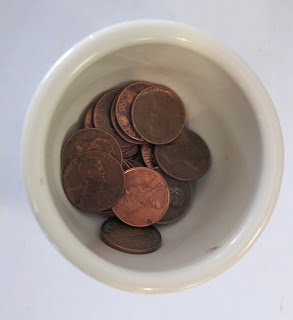They say the National debt is $14,000,000,000,000.
The average
family credit card debt in the U.S. is about $16,000.
The average
student loan debt is $25,000.
We’re told
that this debt will destroy our country, our families, and our potential.
Maybe…but I
believe a certain kind of debt could be the thing that holds us together.
I have
other debts.
To my
family, I have a debt I can never repay.
To my
teachers, I owe a debt of gratitude.
I am in
debt to my peers, and past artists who have inspired me.
I am
indebted to my friends and neighbors who never ask for the balance of what I
owe them.
Looking at
the ledger of my life, the accounts are never quite square. From some I
receive, to others I give. We are indebted to each other and the cycle never
seems to end.
In my
neighborhood there is an annual event called the Free Sale where there is no
trading and no money changes hands. I was reminded of the Free Sale a while
back when I was introduced to the small gift economy that had developed out of
a city dumpster in the alley near my apartment. Like the Free Sale, people were
leaving what they wanted to give and taking what they needed. But unlike the
well organized Free Sale, the rules of the dumpster were unspoken.
I am a
participant in this exchange, and have documented its ever-changing contents.
It is a wonder of mixed up treasure and a locus for neighborhood news. Its
layerings of are like a living archeological site continually being excavated
and reburied. An uncurated space, it is organized only by those who go through
it looking for things, those who add to its bounty, and the sanitation workers
who empty it once a week.
I always
thought I would make something of my observations, but have hesitated until
now. I held off because I worried that drawing too much attention to this place
might overwhelm it. Now, I take that risk. Plans for a hotel to go in the space
across from the dumpster have been filed with the city. Although It’s not clear
how use of the dumpster would change if the hotel is built, the alley would
become a far cry from the pedestrian corridor and improvised gathering place it
is now.
Through
photographs, interviews with participants, a regular inventory, and modest publication
given away for free, this project will explore the economy of and stories
connected to the dumpster. By shedding light on an alternate economy hidden in
plain sight, I hope that others will be inspired to reflect on how gifts of
labor, teaching and time, as well as things, can help bind us together in a
connected circuit of good will. In other words, how this asymmetrical cycle of
giving and taking engenders new relationships, creating a network of mutual indebtedness.







